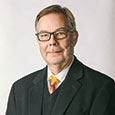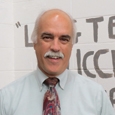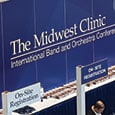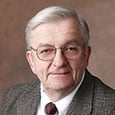He joined Berklee College of Music in 1994 as a department chair and is currently vice president for academic affairs/vice provost. He has been a frequent adjudicator for marching band, drum corps, and indoor percussion competitions for many years. He also composed the theme for the Drum Corps International (DCI) broadcasts and was elected to the DCI Hall of Fame in 2007.
He remains an active composer, arranger, and clinician for concert and marching ensembles. His works include compositions for concert band, orchestra, jazz ensemble, percussion ensemble, and marching band. His commissioned compositions have been premiered by many college and high school ensembles, including most recently by the Northwestern University Symphonic Wind Ensemble and Northshore Concert Band, both directed by Mallory Thompson. He received the Doctor of Philosophy degree from Boston College, and the Master of Music and Bachelor of Music Education degrees from Northwestern University.
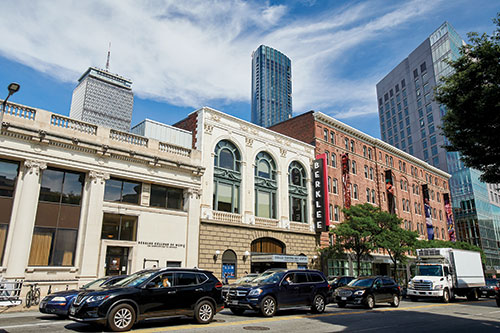
My father played the drums, and I picked that up at age four or five. I started taking piano lessons when I was eight from a wonderful woman who also taught me on a Hammond organ. She was the organist at a local church, so she had an organ at her place. I grew up in Franklin, Pennsylvania, which is a small town of about 10,000 people. I was not headed toward a career in music at all. I thought about computer programming or something like that.
My father’s company got bought by another company, and we moved to Kenosha, Wisconsin when I was 15 years old. In the mid-1960s, Kenosha schools had excellent music programs. There was an incredible superintendent of music, Ralph Houghton, as well as outstanding teachers and parental support.
It was really because I moved to Wisconsin and experienced the music programs there that I decided to pursue music as a career. I started drum lessons and vibraphone voicings and improvisation with Manny Mitka, who focused mostly on jazz. After a few years, he said, “I’ve taught you all I can” and recommended I take lessons from Gordon Peters, who was a longtime percussionist of the Chicago Symphony and faculty member at Northwestern University.
By that time Peters was no longer at Northwestern, but one of his students, Terry Applebaum, who became a mentor to me and remains a dear friend, was there, so I got hooked up with him. Almost every Saturday of my senior high school year, I would take the train from Kenosha to Evanston to take a lesson and play in a high school percussion ensemble.
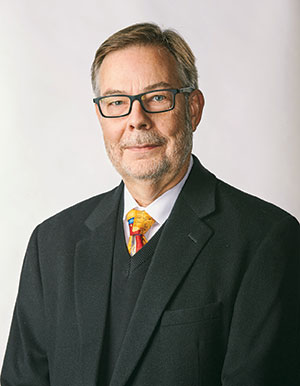
When did you become interested in arranging?
I went to Tremper High School in Kenosha, which held a variety show every year. In my junior year, the band director, Allan Harris, told the band one day, “We’re looking for arrangers for the variety show. If you’re interested in arranging something for the show, come see me.” So, I went to see him and ended up writing an arrangement of a pop tune for a male quartet. I think it was Sunny. I listened to the record and transcribed it.
That is how I started learning about arranging, by just transcribing passages of a chart off a record. I ended up transcribing Buddy Rich tunes as well as a lot other things. I also studied the scores of various concert band, orchestra, and jazz ensemble pieces – looking at how the composers orchestrated and voiced passages.
I was a featured soloist with the symphonic band in my senior year on xylophone, so I decided to play Flight of the Bumblebee and wrote the arrangement for the band. By this point, I had been doing some arranging, orchestrations, and a little bit of composition. I really enjoyed the writing process, especially the theory and analysis parts, most of which I picked up through arranging and studying the pieces I had transcribed. I didn’t know all the technical terms at that time.
My lessons at Northwestern every Saturday essentially became an audition to apply for the music school. It wasn’t a hard and fast decision to major in music; I just morphed smoothly into it through high school. It was a natural progression.
What was your experience like at Northwestern?
I earned my bachelor’s degree in music education. I wasn’t sure I wanted to pursue a career in writing, and everyone was encouraged to have a backup plan. I thought teaching would be great. So, I took music ed classes, but still wrote a lot. About halfway through the program, I realized that I did not want to teach. There was no reason to pursue a different major at that point. I enjoyed it and learned a lot about writing through the music education classes, but decided to augment by taking writing electives – mostly arranging and orchestration courses. I also pursued a lot of writing opportunities on my own using the resources at Northwestern. I wrote a lot for the Northwestern marching band, jazz ensemble, percussion ensemble, Waa-Mu Show, and vocal groups. I was writing all the time. My career plans shifted in a writing direction. Ironically, I received a bachelor’s in music education and stayed at Northwestern for a master’s in percussion performance, but my career ended up being in writing. The path to a career in music is rarely linear.
I had great exposure to music in the Northwestern bands and loved my time with John Paynter – another mentor. I studied conducting with him as a Master’s student. He was such a great thinker and had great ears. He also could make the right comment at the right time. He had a wonderful way of telling a story that ended with a moral that you could really relate to about how to musically interpret a passage. He was fierce and focused. No nonsense, but that laugh! I thoroughly enjoyed my time with him.
My Master’s year was the best time, because I was free to take a lot of courses. Terry told me several years later that NU used me as a guinea pig for a new emphasis in the Master’s program. They allowed me to essentially design my own major and take music courses I wanted, except I had to take percussion lessons, which was my major, and give a recital.
I worked hard but loved every minute of it. I did a couple of independent studies with a few jingle writers in Chicago. Jingle writing was a natural transition out of school. I was focused mostly on contemporary music and fascinated by the process of writing music for advertising.
I landed a job at a place called Com/Track in Chicago writing jingles. I wrote a lot of arrangements and instrumental music. At that point, I didn’t write many of the spots that had lyrics, as they had other songwriters there who were lyric specialists. The company usually paired a songwriter with an arranger.
How did you end up in California?
I was interested in writing music for movies, which of course at that time meant going to California. My Northwestern teacher, Terry Applebaum, introduced me to Jim DiPasquale, who Terry had gone to Northwestern with. DiPasquale was a great writer who started off writing jingles in Chicago. He later moved to LA to write for TV and films but often came back to Chicago. I started doing some orchestrating and simple projects for him. When I told Jim about my plans, he said, “Here’s what you do. Save $10,000, because that will get you through about a year if you don’t find work (remember, this was around 1976). Put together a demo reel and then when you come out, give me a call. We’ll see what we can do.”
I went to LA for a couple of weeks of vacation to check it out. I called Jim, met some people, and really liked it there. While working for Com/Track, I also had the opportunity to go to LA to record some jingles, which confirmed my decision to move to LA and write music for films and television. Most of the movies and television shows were shot there, and the music written for them was done there. I saved $10,000, packed up the car, and drove to LA in September 1977.
When I reached LA, I called Jim and said, “I’m here.” He told me, “Come on over. I need some orchestration help for a TV series.” He lived only four or five blocks away, and I didn’t even stop to unpack. When I arrived, he said, “Here’s my sketch. This is what we need.” I started to orchestrate for the television shows he was writing music for. I orchestrated for TV for a couple of years and also flew back to Chicago to work on jingles in between the TV writing. Over time, I ended up providing music for several television shows as well as a few movies. While in LA, I started a jingle company with three others, which became very successful in the 1980s and early 1990s. I was president and handled the books and accounting. Writing and producing jingles kept me busy and paid the bills.
In hindsight, I wish I had gotten out to LA a little earlier because I missed some development of the musical scene. As 1980 approached, computer programs and music technologies for creating music were emerging and being integrated into the writing processes and production of music. It became viable to record jingles using synthesizers, rather than a string section and also to incorporate a wide variety of different sounds that synths could create. The advertising agencies realized this, and budgets for jingles started shrink. They also kept expecting more because they knew you could create the tracks using fewer people.
About the same time, the ad business started to move away from jingles. They would pay to use an existing song that people recognized, instead of looking for original tunes. The heyday of jingles was probably the 1960s into the mid 1980s. Today, there are far fewer original jingles on the air.
What was it like writing ad jingles?
The hardest part at the beginning was investing a lot of time, emotion, and energy into creating the 30- and 60-second compositions, then having the ad agency producer say, “We need to chop out that section. It’s not going to work.” I learned quickly not to take it personally because their priority was getting music that worked for the total commercial. They have different reasons for wanting something in the music, more focused on marketing purposes. They also had to sell it to their client. You just have to accept that and move on the best you can. It was rare when the music for the commercial turned out exactly as it was originally written.
I didn’t always love what I wrote, but I was certainly invested in doing the best I could. When the ad people said they didn’t like the ending, it sometimes meant compromising a bit, but it is a business. It is goods for services rendered, and I wanted to be paid, so I gave them what they wanted.
Jingles were the best training ground for learning to write fast and how to blend styles. The agency producers and writers might say, “We need something that’s country, Indian raga, metallic rock. Have you done any stuff like that?” Even if you hadn’t, you wouldn’t say no. I started my research by listening to the music in the styles they wanted and then blending the styles together.
I got to work in Chicago and LA with many of the best musicians in the world. You could go down the list. “Let’s get Vinnie Colaiuta. He’s busy? OK, let’s get J.R. Robinson. Let’s get Harvey Mason, Rick Marotta, Steve Houghton, Ralph Humphrey.” Those were just a few of the great LA drummers at that time. You are working with these incredible musicians. You have your own chart and how you want to produce it, but they bring something else to the whole process that just elevates it. They add such creativity – something you hadn’t thought about, the way they shape and phrase the lines or fashion the groove. It was a magical time to be in the studios.
An interesting part of the business was the unpredictable schedule. We could get a call one day and be in the studio recording it the next day. It was instant gratification, and the end result usually went on the air pretty quickly. It was important to evaluate how it sounded on the air. Determining whether something sounded good was a craft and an art. It may sound great in the studio on big speakers, but getting it to also sound great on a little TV speaker was different. We would adjust mixes for that. It was a great learning experience in many ways, and I enjoyed it all.
How did you get connected with the Boston Crusaders?
I had started judging drum and bugle corps contests in the Midwest in 1976 and taught with the Cavaliers Drum and Bugle Corps for a couple of years. Cliff Colnot, who was at Northwestern with me and was a friend of mine, was the brass arranger for them. He asked me to work with the mellophones at the weekly rehearsals. The next year, another friend of mine, Dan Spalding, was the percussion writer and asked me to work with the keyboards. In 1976, marching keyboards were brand new in drum corps. The Cavaliers had a xylophone and a bell player, so I worked with the two of them. I continued judging, and after I had moved to LA, was accepted to judge for Drum Corps International.
I might have been the one of the first percussion judges with a Master of Music degree. At that time, it was most common for judges to have started in drum corps as players. My judging approach incorporated a broader music and writing perspective about percussion that had not been common.
I would ask the percussion players, “Why are you phrasing this way, while the horns are phrasing another way?” I think people appreciated my different perspective – for the most part.
Most of the music judges have degrees now, and most are band directors or writers and active in the profession, which is completely different than in the 60s and 70s. I judged for a number of years and was the DCI judge administrator for five years. I took a year off and wrote the brass arrangements for Santa Clara Vanguard in 1993.
I returned to drum corps judging in 1994 and did that through 2001. From 2002-2011, I was the brass arranger for Boston Crusaders and also the program coordinator for the last four of those years. After 10 years, I went back into judging for DCI, which I have continued to do.
What led you to Berklee?
While I was in LA, friends who taught at colleges brought me in for a couple days to present clinics on the music business and writing for advertising and film. I really enjoyed the college environment and working with students. In 1993, I saw a job posting for a department chair at Berklee in the professional writing division. They were looking for someone to bring music production into the writing and arranging curriculum, expand writing to include the use of electronic instruments in addition to acoustic instruments, and who also had management experience. With my company in LA, I had learned a lot about accounting, business, and managing people.
The job in Boston came up at the right time. The music business in LA was starting to wane, and my wife at the time and I didn’t want to raise children there. I applied and was offered the position, and we moved in July of 1994.
I was hired as the department chair of the Commercial Arranging department. That major focused on writing for acoustic situations with very little attention on technology. My boss, Joe Smith, who had also come from LA the year before, told me, “You need to reimagine this curriculum and make it more contemporary.”
During my first year, I got to know faculty members and the courses. We decided to change the name of the major to Contemporary Writing and Production. The music business was changing dramatically. The students in the program not only had to be writers and arrangers, they also had to know about technology and production, the music business, finances, and being entrepreneurial.
I worked with the faculty to revamp the curriculum, eliminating or gutting some courses and changing many others. I developed some courses myself and taught a few. The major ended up having two parallel curricular tracks, an acoustic track and a technology/electronics track. Students would take courses in both tracks and for most writing projects, blend elements from both together. They would still have to demonstrate that they can write in different styles and for horns, strings, and a rhythm section, but they also have to show that they can integrate electronics and create pieces that are solely electronic. When they graduate, they will most often be using a mix of the two.
I applied for and was offered the position of assistant vice president for academic affairs in 2001. This led me to new challenges in different areas at Berklee. Following that, I was promoted to associate provost and, eventually, vice president for academic affairs/vice provost. My current responsibilities encompass overseeing space planning for academic affairs, faculty development, library and learning resources, academic technology, and concert operations, as well as work on managing the capital and operating budgets for academic equipment. I also manage academic policy development, setting the academic calendar, and am involved in collective bargaining with the faculty union.
I have done almost everything a person could do in academic affairs in a music school. It has been fun and never dull. I have had a whole range of experiences and enjoy being exposed to the creativity of the students and the faculty.
I don’t deal with students on a regular basis anymore, but they are why we are here. There is a recital hall by the door I go out at the end of the day. Once in a while I stop and just listen. These students are making great music. They are so creative and talented. They provide the energy that brings me back charged up the next day.
As a final note, after 28 years, Jay will be retiring from Berklee at the end of 2022 and embark on new life adventures.
